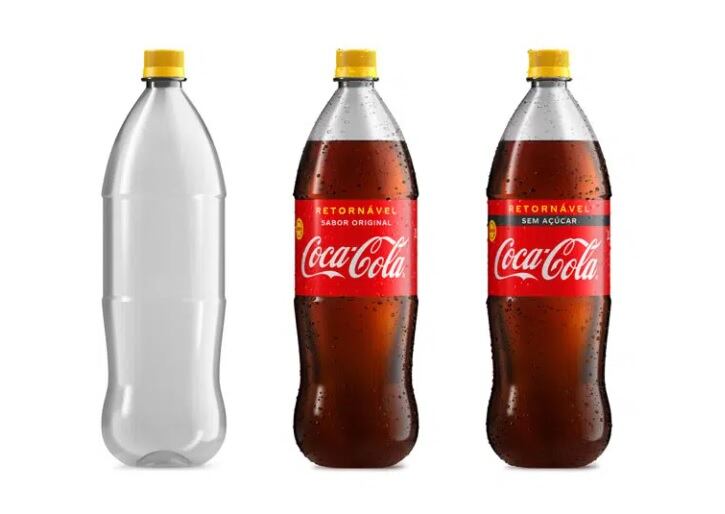‘Reusable packaging’, in the context of Coca-Cola’s goal, includes refillable or returnable glass and plastic bottles as well as dispensed solutions where consumers refill a reusable container (this definition is in line with International Organization for Standardization (ISO) definitions used by the Ellen MacArthur Foundation).
Reusable packaging currently accounts for around 16% of the company’s total volume: although this varies greatly by market. In 20 markets, for example, returnable glass bottles and refillable PET already represents more than 50% of its sales. In another 20 markets, they account for more than 25% of sales.
“Use of refillables is growing in several markets, outperforming non-refillables in Germany and parts of Latin America, where reusable bottles represented 27% of transactions in 2020,” notes Coca-Cola.
Universal bottle
Coca-Cola introduced its ‘Universal Bottle’ in 2018 in Brazil, with the format now also used across Argentina, Brazil, Chile, Colombia, Mexico, Guatemala and Panama. The reusable PET bottle can be used across multiple soda brands.
When a consumer finishes a drink, they can return the bottle to the point-of-sale: receiving a discount on their next purchase. Retailers store the empty bottles and then return them to Coca-Cola upon delivery of a new order. Coca-Cola takes the bottles back to a bottling facility where paper labels are washed off; bottles are cleaned; and then refilled and rebranded with a fresh label.
On average, these bottles are reused up to 25 times, reducing overall plastic use by 90%. In Brazil, Coca-Cola produced 1.8 billion fewer bottles in 2019.
Compared to single use PET bottles, greenhouse gas emissions are reduced by 47%. Even with washing factored in, water consumption is reduced by 45% - water being a major consideration in cities such as San Paolo.
Coca-Cola is now pledging to expand the rollout of the universal bottle. “This innovative solution drives efficiency of collection, cleaning and filling by offering multiple sparkling and still brands in the same reusable bottle with a single color, shape and size. EMF recognized the Universal Bottle as a leading practice on reuse.”
In South Africa, Coca-Cola is expanding the rollout of refillable 2 liter and 1.5 liter PET (RefPET) plastic bottles, which can be cleaned, refilled and reused up to 14 times. After this, they can be recycled and made into new bottles.
In France, Coca-Cola is partnering with supermarket Carrefour to pilot a circular shopping system called Loop. Consumers can order a variety of products, including Coca-Cola beverages, delivered to their home in customized packaging that is collected, cleaned, refilled and reused or recycled.
In the US, Coca-Cola is partnering with Burger King and TerraCycle for a pilot program in select cities to reduce single-use packaging waste by offering reusable food containers and beverage cups.
Meanwhile, it has been trialing the use of reusable cups with microchip technology for use with Coca-Cola Freestyle machines for use at theme parks, and on university campuses and cruise ships. These refillable beverage containers are equipped with micro-chipped, ValidFill radio frequency identification (RFID) technology, which directly interact with the Coca-Cola Freestyle machine, allowing preset pours of consumers’ drink choices.
The technology has already been trialed at sites in the US, UK and Canada.
“These and other similar sustainability efforts helped pave the way for the global reusable packaging target we are announcing today, which will require significant investment, particularly in markets with limited refillable/returnable infrastructure,” says Coca-Cola.

